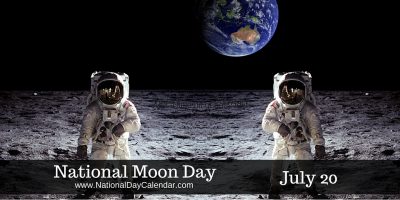
National Moon Day is observed annually on July 20 and commemorates the day man first walked on the moon in 1969. NASA reported the moon landing as being “…the single greatest technological achievement of all time.”
On July 20, 1969, Apollo 11 landed the first humans, Americans Neil Armstrong and Buzz Aldrin, on the moon. Armstrong stepped first onto the lunar surface, six hours after landing and spent two and a half hours outside the spacecraft. Aldrin spent slightly less time but together they collected 47.5 pounds of lunar material to bring back to Earth. Michael Collins piloted Apollo 11 and remained alone in orbit until Armstrong and Aldrin returned.
Watched by millions, the event was broadcast on live TV to a world-wide audience and all witnessed as Armstrong stepped onto the lunar surface and described the event as “one small step for [a] man, one giant leap for mankind.”
NATIONAL MOON DAY HISTORY
In 1971, President Richard Nixon proclaimed National Moon Landing Day on July 20 to commemorate the anniversary of man’s first moon landing.
With no continuing proclamation to follow, Richard Christmas took up the baton and began a “Chrismas Card” writing campaign. A former gas station attendant, the Michigan native wrote to governors, congressmen and senators in all 50 states urging them to create National Moon Day. By July of 1975, 12 states had sponsored bills observing Moon Day.
James J. Mullaney, former Curator of Exhibits and Astronomy at Pittsburgh’s original Buhl Planetarium and Institute of Popular Science and Staff Astronomer at the Allegheny Observatory, is a modern day supporter of a National Moon Day. He says, “If there’s a Columbus Day on the calendar, there certainly should be a Moon Day!” Mr. Mullaney has been working toward making National Moon Day an official Federal holiday.
Video from the History Channel












